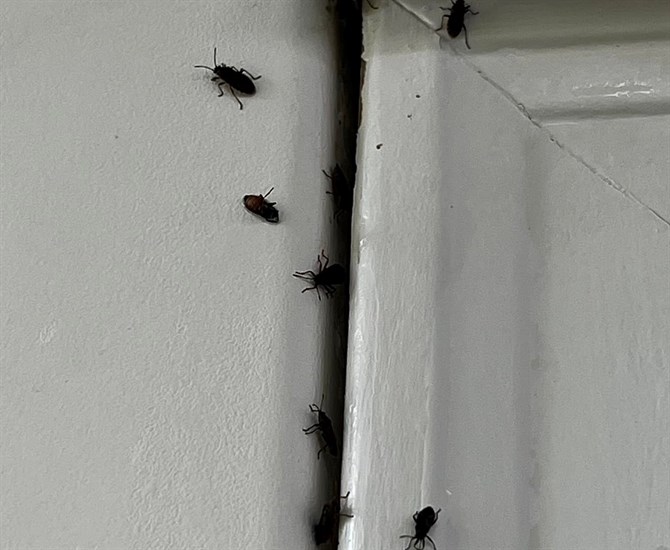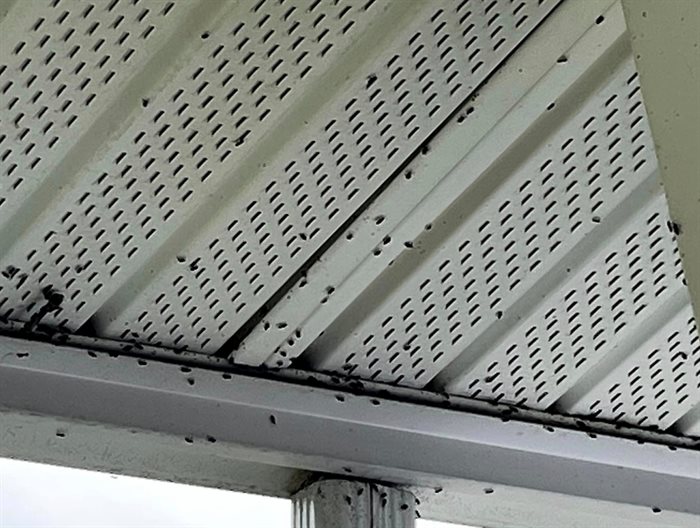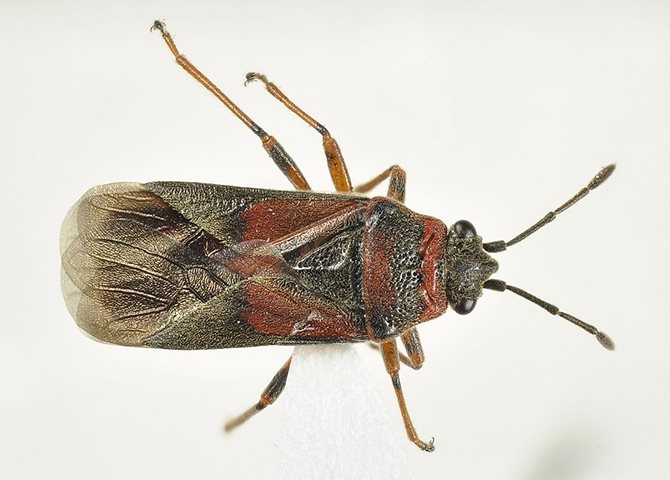BEETLE INVASION: Elm seed bugs making a nuisance of themselves in Okanagan, Kamloops

A Lake Country resident is losing the war against the excessive number of invasive elm seed bugs in her yard and home.
Sandy Daw said she’s seen over 1,000 of the bugs in the past two weeks compared to the same time last year when she only saw around 30.
“They were pouring out of the soffit on the patio like a fountain, it was like someone turned on a tap,” Daw said. “I should have taken a video, it was something out of a bad 1970s horror movie.”
Over the past two weeks, Daw has tried every natural home remedy she can think of, spent time and money to buy oils and detergents, and phoned an arborist and pest control company for help. She applied chemicals to her property but later washed them off out of concern for her dogs’ safety.
She still has bugs inside and outside her home.
“I found out where we don’t have proper weather stripping,” she said. “They are smelly and leave some kind of secretions, maybe it’s poop. They get under trims and frames and in vinyl siding where you bang on it and they all come pouring out.”
Daw said she’s not the only one with a big bug problem.
“Everyone at London Drugs in Kelowna and Vernon automatically say ‘oh, you have the beetle’ when I bought peppermint oil or detergents,” she said. “Workers in the detergent aisles at Home Depot all know about it and talk about it. It’s interesting how bad it is here.”
Despite the ordeal, Daw said it’s important to keep a sense of humour.
“I went outside and had them in my hair and all over my body,” she said. “When I came in the house I tried to shake them off but had to put up my hair and have a shower to get them all off. I cleaned all my patio furniture and in less than a day it was completely covered in bugs.”
Daw wants to bring awareness to the root of the problem. She hoping municipalities will remove the elm trees and where the trees are sold come with a disclaimer or warning about the elm seed bug problem.
“I phoned an arborist who said someone in my neighbourhood must have a Chinese elm tree and the issues will continue until the tree is disposed of. Pest control said the only real solution is to remove the elm tree.”
ORKIN Canada Kelowna Manager at Matthew Wright said it is without a doubt the worst season on record and his company is constantly getting calls about the bugs.
He said the solution is simple. Remove unwanted elm trees in areas they’re not needed and get the ones on your property sprayed.
“It’s just going to get worse every year until something is done about the elm trees,” Wright said. “The invasive trees are along the highways in the Okanagan and their seeds spread quickly, they are well adapted to the conditions here.”
READ MORE: TRENDING NOW: Whatever this squirrel is eating must be really good
Elm seed bugs are from Europe and the Mediterranean region and were first reported in Kelowna in 2016, according to the BC Ministry of Agriculture website, and have since spread throughout the southern Interior. They don’t affect agriculture and they don’t bite, but can be annoying when high numbers of them get into homes and businesses. The bugs emit a gross smell when they’re crushed and cover structures with droppings.
READ MORE: Here’s your chance to help expand Okanagan Mountain Park
The bugs are roughly 1/3 of an inch long, and black and rusty red in colour. They have black triangles in a rust-coloured square on their backs.
Bugs overwinter in and around structures and come out in the spring to lay their eggs on elms. Nymphs feed on elm seeds in the spring but don’t cause much damage to the trees. In Interior BC, they are present from May to September.
Residents can help reduce the bugs by sealing off entry points, vacuuming up the bugs using a shop vacuum with a couple of inches of soapy water in the bottom to drown them, and using sticky traps around window sills.
READ MORE: iN VIDEO: Goose found stuck with arrow released from care at BC Wildlife Park
Elm trees should be removed or pruned to reduce the food source, and seeds and debris should be cleaned up from properties.
While the ministry doesn’t recommend using insecticides in the home, high numbers of bugs can be treated in immature stages by spraying a barrier spray outside along foundations, patios, doors and windows to prevent them from getting inside, or a commercial pesticide applicator can be hired.
To contact a reporter for this story, email Shannon Ainslie or call 250-819-6089 or email the editor. You can also submit photos, videos or news tips to the newsroom and be entered to win a monthly prize draw.
We welcome your comments and opinions on our stories but play nice. We won't censor or delete comments unless they contain off-topic statements or links, unnecessary vulgarity, false facts, spam or obviously fake profiles. If you have any concerns about what you see in comments, email the editor in the link above. SUBSCRIBE to our awesome newsletter here.





